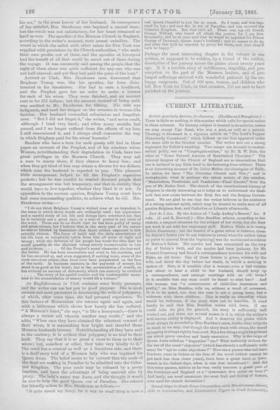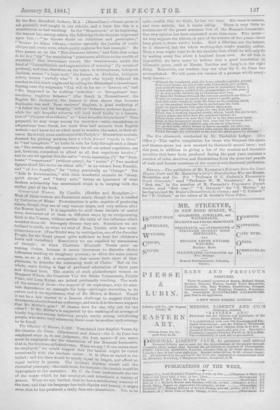Second Steps to Greek Prose Composition, with 3fiscellaneous Aids to
Accentuation, and Examination Papers in Greek Scholarship.
By the Rev. Blomfleld Jackson, M.A. (11facmillan.)—Greek prose is not generally well taught in our schools, and a book like this is a contribution to bad teaching. In the " Memsoesvect," at its beginning, the learner has, among others, the following choice maxims impressed
upon him throws doubt on infinitives and participles ;" 41"Eheyor dr, Kopos ramte,—notice specially the jumble of oratio obliqua and oratio recta, which partly explains 'the last example." He then passes on to the "Miscellaneous Idioms," and finds that toil= kel is a " tip " for translating " permanent addition to the wealth of mankind ;" that brroyseLseev comes, like heraxeicepeeo's, under the head of "Intensification and augmentation of meaning" (by means of prefixes), and that, therefore, as the latter, in Aristophanes, in leirrete Jackson, means "a huge cock," the former, in Alschylus, interprete eodeni, means "awfully wise "! A pupil who loyally followed his teacher on this track might and by calling the Mississippi a freoroeaaos. Passing over the enigmatic "You will do for me = 'Arm-0%4's rrU," and 4' We happened to be walking nobodies' = 'Erserx‘e,sell secere'L'eres TexmitAres. easepcorot" (the Greek is Demosthenes', the English Mr. Jackson's), the learner is then shown that because Sophocles has said 'Erya apetacrov' lryx4pos, a good rendering of "A follow too bad for hanging " will bo 'AeOpeoror orpetercrwr ayx6Pns : while the epic Borponr srheerai will lend itself kindly to a transla- tion of " Chapter of accidents," as " Kale& flo.rinay ireereedesea." Thus prepared, he may range among the exercises—some, translations or adaptations from Greek, but more than half extracts from English writers—and know not at which most to wonder, the notes, or their ab- sence. He is told, when confronted with Carlyle's " Misorablest mortals, doomed for picking pockets, have a whole five-act tragedy in them," to " use tpareStreds :" he looks in vain for help through such a clause as, " The senses, although necessary for all our actual cognitions, are not, however, competent to afford us all that cognitions involve ;' but he can set against this the naive " irAdia teaproOpci (?)" for " fruit- boats," "voeporeeret" (without query), for "mutes" (" Two masked figures stood like mutes on either side," in an extract from Froude), and " Tt; UPTI ayopaCetv," for "being practically on 'Change." The "Aids to Accentuation," with their wonderful remarks on "sharp, quick stress," and " heavy note," betray an ignorance of what modern scholarship has ascertained which is in keeping with the earlier part of the book.



































 Previous page
Previous page